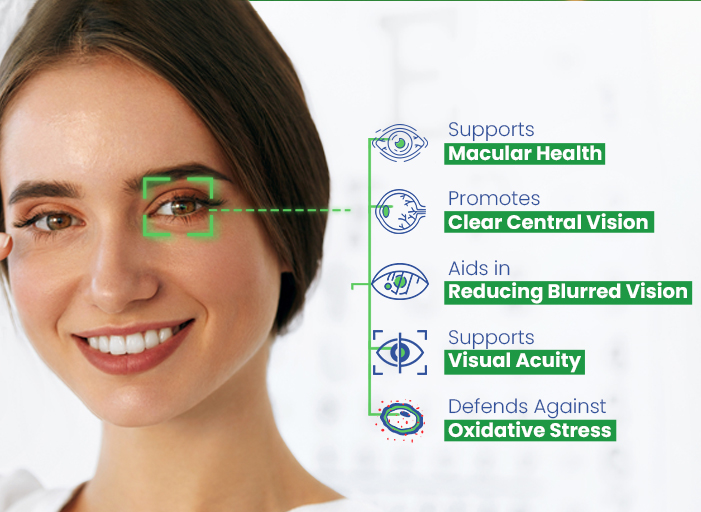Thursday, August 1, 2024

In today’s digital age, our eyes are constantly bombarded with blue light from screens, leading to a surge in vision-related problems. As we spend more time staring at our devices, the risk of macular degeneration, cataracts, and other eye diseases increases. But what if there was a way to fortify our eyes against the digital onslaught? Enter lutein and zinc, two potent nutrients that have been shown to play a crucial role in maintaining optimal vision health.
In this article, we’ll probe into the science behind these vision superheroes and explore how they can help us navigate the digital landscape with clarity and confidence.
Key Takeaways:
- Lutein and Zinc are necessary nutrients for maintaining healthy vision, particularly in the digital era where prolonged screen time can lead to increased eye strain and damage.
- Consuming adequate amounts of Lutein, a carotenoid found in leafy greens and other fruits and vegetables, can help protect the eyes from Blue Light emitted by digital devices, reducing the risk of macular degeneration and cataracts.
- Zinc, a necessary mineral, plays a critical role in maintaining healthy vision by supporting the functioning of the retina and optic nerve, and deficiencies in zinc have been linked to increased risk of Age-Related Macular Degeneration.
The Impact of Digital Era on Vision Health

Before the widespread adoption of digital technology, vision health was largely influenced by genetics, nutrition, and environmental factors. However, the rapid growth of digital devices and screens has introduced new challenges to our visual system, putting unprecedented pressure on our eyes.
Prolonged Screen Time and Eye Strain
Digital advancements have led to a significant increase in screen time, with the average person spending over 4 hours a day staring at a screen. This prolonged exposure can cause eye strain, dryness, and fatigue, as our eyes are not designed to focus on a single point for extended periods.
Blue Light Exposure and Its Effects
Vision in the digital era is also affected by the high-energy visible (HEV) light emitted by digital devices, commonly known as blue light. Prolonged exposure to blue light has been linked to disrupted sleep patterns, headaches, and eye discomfort.
This type of high-energy light penetrates deeper into the eye, causing oxidative stress and inflammation, which can lead to long-term damage to the retina and increase the risk of age-related macular degeneration. Furthermore, blue light exposure can also exacerbate existing eye conditions, such as cataracts and glaucoma, making it crucial to take proactive measures to mitigate its effects.
The Role of Lutein in Vision Health

It is well established that lutein plays a critical role in maintaining optimal vision health, particularly in the digital era where our eyes are constantly exposed to blue light emitted from screens.
What is Lutein and Its Functions
Lutein, a carotenoid pigment, is a powerful antioxidant found in various fruits and vegetables. Its primary function is to protect the eyes from oxidative stress and inflammation, thereby reducing the risk of age-related macular degeneration (AMD) and cataracts.
Lutein-Rich Foods and Supplements
Lutein-rich foods, such as leafy greens like kale and spinach, corn, and squash, provide an excellent source of this important nutrient. Lutein supplements are also available for those who struggle to incorporate these foods into their diet.
The importance of consuming lutein-rich foods and supplements cannot be overstated. Research has shown that individuals who consume high levels of lutein have a significantly lower risk of developing AMD, a leading cause of vision loss in older adults. Moreover, lutein has been found to improve visual performance, particularly in low-light conditions, making it an important nutrient for individuals who spend extended periods in front of screens.
The Importance of Zinc in Vision Health
Many studies have highlighted the crucial role of zinc in maintaining optimal vision health. As a crucial mineral, zinc plays a vital part in various bodily functions, including eye health. Its importance cannot be overstated, particularly in the digital era where our eyes are constantly exposed to blue light and other visual stressors.
Zinc’s Role in Eye Function and Development
Functioning as an antioxidant, zinc helps protect the eyes against oxidative stress and inflammation, which can lead to age-related macular degeneration and other vision problems. Additionally, zinc is involved in the synthesis of melanin, the pigment responsible for eye color, and is also necessary for the development and maintenance of healthy retinas.
Zinc Deficiency and Its Consequences on Vision
Functioning below optimal levels, a zinc deficiency can have severe consequences on vision health, including impaired night vision, cloudy cataracts, and increased risk of age-related macular degeneration.
For instance, research has shown that individuals with zinc deficiency are more likely to experience vision loss and blindness. Furthermore, zinc deficiency has been linked to an increased risk of diabetic retinopathy, a common complication of diabetes that can cause blindness if left untreated. It is crucial to maintain adequate zinc levels to prevent these vision problems and ensure optimal eye health.
Enhancing Vision Health through Nutrition and Lifestyle
Not surprisingly, a healthy diet and lifestyle play a significant role in maintaining good vision health. While lutein and zinc are necessary nutrients for eye health, they must be combined with a balanced diet and regular exercise to maximize their benefits.
Balanced Diet and Regular Exercise for Healthy Vision
One of the most effective ways to support vision health is through a diet rich in fruits, vegetables, and whole grains. These foods provide necessary vitamins, minerals, and antioxidants that help protect the eyes from damage. Regular exercise also plays a crucial role in maintaining healthy blood flow and oxygenation to the eyes.
Good Sleep Habits and Reduced Screen Time for Better Eye Care
Any effort to enhance vision health must also consider the importance of good sleep habits and reduced screen time. During sleep, the eyes have a chance to rest and recover from the stresses of the day, while excessive screen time can lead to eye strain and fatigue.
Reduced screen time is particularly important in today’s digital era, where many people spend hours each day staring at computers, smartphones, and televisions. By setting limits on screen time and engaging in regular eye exercises, individuals can reduce their risk of developing eye problems such as dry eye syndrome and myopia. Moreover, good sleep habits can help to regulate the body’s natural repair processes, which are necessary for maintaining healthy vision. By prioritizing sleep and reducing screen time, individuals can take a proactive approach to protecting their vision health.
Final Words
So, as we navigate the digital landscape, it’s clear that our vision health is more critical than ever. By incorporating lutein and zinc into our daily lives, we can take proactive steps to protect our eyes from the damaging effects of blue light and oxidative stress. As we look to the future, it’s imperative to prioritize our vision health, not just for our individual well-being but also for our collective ability to thrive in this rapidly changing world.
FAQ
Q: What is the impact of digital devices on vision health, and how can lutein and zinc help?
A: Prolonged use of digital devices, such as computers, smartphones, and televisions, can lead to digital eye fatigue, dry eyes, and increased risk of age-related macular degeneration (AMD). Lutein and zinc, two necessary nutrients, play a crucial role in protecting vision health in the digital era. Lutein, a carotenoid antioxidant, helps filter out blue light emitted from digital devices, reducing eye strain and damage to the macula. Zinc, a necessary mineral, supports the health of the retina and optic nerve, promoting healthy vision and reducing the risk of AMD. Supplementing with lutein and zinc can help mitigate the negative effects of digital device use on vision health.
Q: How do lutein and zinc work together to support vision health, and what are the benefits of combining them?
A: Lutein and zinc have a synergistic relationship, meaning they work together to provide enhanced benefits for vision health. Lutein helps to protect the macula, the part of the eye responsible for central vision, from oxidative stress and blue light damage. Zinc, on the other hand, supports the health of the retina and optic nerve, promoting healthy vision transmission. When combined, lutein and zinc provide comprehensive protection for the eyes, reducing the risk of AMD, cataracts, and other vision problems. The benefits of combining lutein and zinc include improved visual acuity, reduced eye fatigue, and enhanced overall vision health.
Q: How can I ensure I’m getting enough lutein and zinc in my diet, and are supplements necessary?
A: While it’s possible to get some lutein and zinc through dietary sources, such as leafy green vegetables, nuts, and fortified cereals, many people may not consume enough to support optimal vision health. Dark leafy greens like kale and spinach are rich in lutein, but cooking and processing can reduce their bioavailability. Zinc-rich foods like oysters, beef, and chicken may not provide sufficient amounts for optimal vision health. Supplements can help fill the nutritional gap, providing a concentrated dose of lutein and zinc. When choosing a supplement, look for products that contain bioavailable forms of lutein and zinc, such as Lutemax 2020 and zinc gluconate, and follow the recommended dosage to ensure optimal benefits for vision health.

